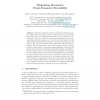Free Online Productivity Tools
i2Speak
i2Symbol
i2OCR
iTex2Img
iWeb2Print
iWeb2Shot
i2Type
iPdf2Split
iPdf2Merge
i2Bopomofo
i2Arabic
i2Style
i2Image
i2PDF
iLatex2Rtf
Sci2ools
96
Voted
ESA
2009
Springer
2009
Springer
Minimizing Movement: Fixed-Parameter Tractability
Abstract. We study an extensive class of movement minimization problems which arise from many practical scenarios but so far have little theoretical study. In general, these problems involve planning the coordinated motion of a collection of agents (representing robots, people, map labels, network messages, etc.) to achieve a global property in the network while minimizing the maximum or average movement (expended energy). The only previous theoretical results about this class of problems are about approximation, and mainly negative: many movement problems of interest have polynomial inapproximability. Given that the number of mobile agents is typically much smaller than the complexity of the environment, we turn to fixed-parameter tractability. We characterize the boundary between tractable and intractable movement problems in a very general set up: it turns out the complexity of the problem fundamentally depends on the treewidth of the minimal configurations. Thus the complexity of...
| Added | 26 May 2010 |
| Updated | 26 May 2010 |
| Type | Conference |
| Year | 2009 |
| Where | ESA |
| Authors | Erik D. Demaine, MohammadTaghi Hajiaghayi, Dániel Marx |
Comments (0)

